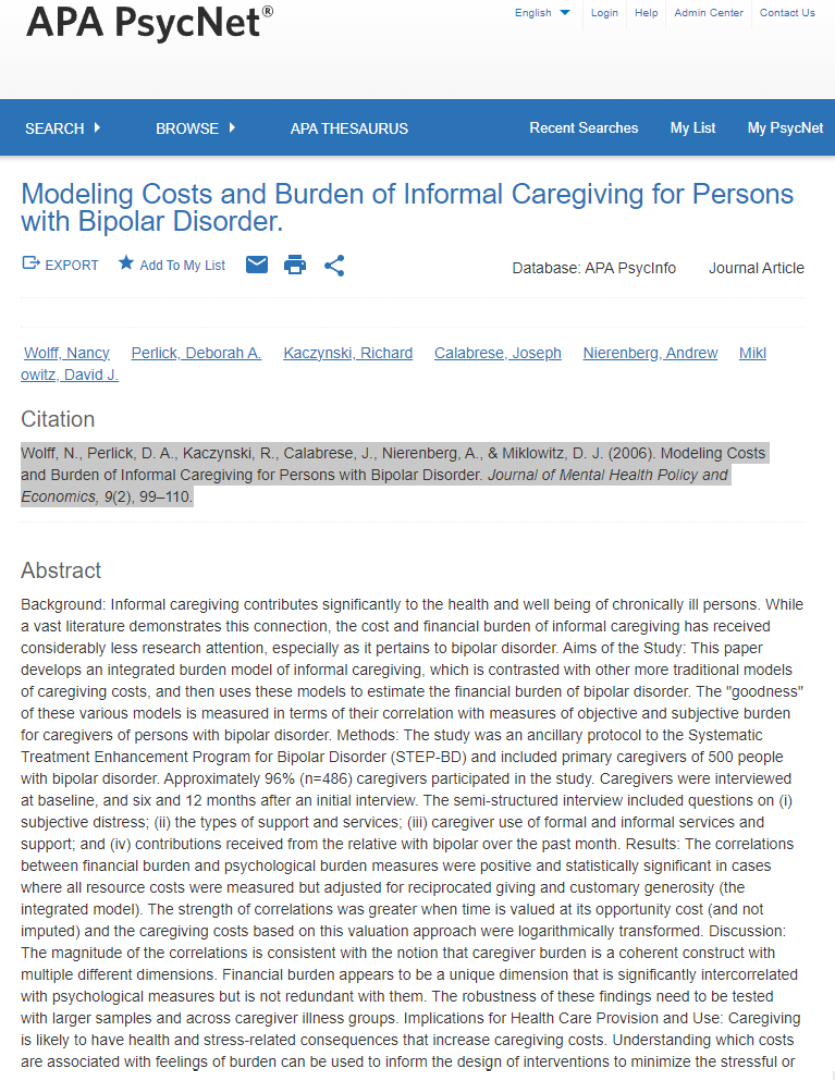Background: Informal caregiving contributes significantly to the health and well being of chronically ill persons. While a vast literature demonstrates this connection, the cost and financial burden of informal caregiving has received considerably less research attention, especially as it pertains to bipolar disorder. Aims of the Study: This paper develops an integrated burden model of informal caregiving, which is contrasted with other more traditional models of caregiving costs, and then uses these models to estimate the financial burden of bipolar disorder. The “goodness” of these various models is measured in terms of their correlation with measures of objective and subjective burden for caregivers of persons with bipolar disorder. Methods: The study was an ancillary protocol to the Systematic Treatment Enhancement Program for Bipolar Disorder (STEP-BD) and included primary caregivers of 500 people with bipolar disorder. Approximately 96% (n=486) caregivers participated in the study. Caregivers were interviewed at baseline, and six and 12 months after an initial interview. The semi-structured interview included questions on (i) subjective distress; (ii) the types of support and services; (iii) caregiver use of formal and informal services and support; and (iv) contributions received from the relative with bipolar over the past month. Results: The correlations between financial burden and psychological burden measures were positive and statistically significant in cases where all resource costs were measured but adjusted for reciprocated giving and customary generosity (the integrated model). The strength of correlations was greater when time is valued at its opportunity cost (and not imputed) and the caregiving costs based on this valuation approach were logarithmically transformed. Discussion: The magnitude of the correlations is consistent with the notion that caregiver burden is a coherent construct with multiple different dimensions. Financial burden appears to be a unique dimension that is significantly intercorrelated with psychological measures but is not redundant with them. The robustness of these findings need to be tested with larger samples and across caregiver illness groups. Implications for Health Care Provision and Use: Caregiving is likely to have health and stress-related consequences that increase caregiving costs. Understanding which costs are associated with feelings of burden can be used to inform the design of interventions to minimize the stressful or burdensome aspects of caregiving. Giving back reduces the magnitude of caregiving costs and the sense of psychological burden. Interventions that develop the potential to “give back” are likely to be beneficial for both the caregiver and the care receiver as it increases reciprocity and decreases dependency. Implications for Further Research: Caution is needed in estimating the costs of informal caregiving needs as many costs are possible but their relationship to burden varies in strength and significance. Assumptions related to what is given and received and how this relates to expected patterns of giving and receiving in measuring and determining financial burden and costs are particularly important, as is the valuation of time. (PsycInfo Database Record (c) 2020 APA, all rights reserved)
Modeling costs and burden of informal caregiving for persons with bipolar disorder
Citation:
Wolff, N., Perlick, D. A., Kaczynski, R., Calabrese, J., Nierenberg, A., & Miklowitz, D. J. (2006). Modeling Costs and Burden of Informal Caregiving for Persons with Bipolar Disorder. Journal of Mental Health Policy and Economics, 9(2), 99–110.
